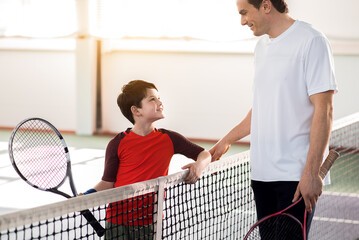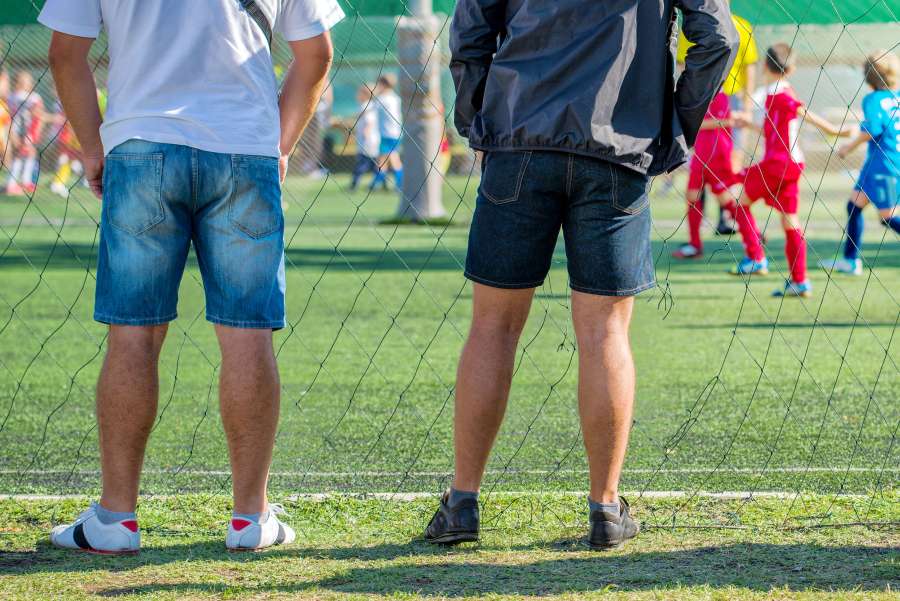Top 3 Mistakes Parents Make with Their Child’s Sports Performance
In this comprehensive post, I’m going to cover the top three mistakes parents make that may be impacting their child’s sports performance.
It’s HARD being a parent. Our subconscious and conscious minds are very busy when it comes to the well being and performance of our children!
The intent of this article is to bring awareness to how a parent might be unintentionally hurting their child athlete. Awareness is a giant step toward breaking through!
Mistake #1
Pointing out your child’s sport performance mistakes to them rather than focusing on what they did right and the progress they are making.
Let me paint a picture for you…
You’re working really hard at your job and doing the very best you can.
Of course, you’re not perfect, but every day you make a dent in your work projects and you certainly have forward momentum in your work.
But guess what? Your boss doesn’t notice your hard work or the slow, but sure, progress you make every day.
Instead he’s only focused on what didn’t get done or what’s not perfect with the work you did do.
How does that make you feel???
Angry, under appreciated, judged unfairly, criticized, unmotivated to work harder?
Here’s another scenario…
At home you have a number of household chores you do. Even a number of little things that the family doesn’t realize you do.
It’s a lot of daily work and what you do is taken for granted…it’s just part of being a mom or a dad.
But, what if your spouse focuses on what you haven’t done…all the projects just sitting there that you haven’t gotten to yet?
Your spouse just nags and complains about what you haven’t done or the way in which you do something.
How does that make you feel???
Angry, frustrated, under appreciated, criticized, passive aggressive, unmotivated to do your chores or projects?
Now, let’s imagine that your boss really understands how hard you work every day.
He or she notices the daily progress you are making and they praise, acknowledge, and compliment you on it! He or she even compliments you on the smallest wins and improvements you make and they’re constantly cheering you on.
How does that make you feel???
Appreciated, understood, grateful, accomplished, confident, excited?
Now, let’s imagine your spouse notices all the little and big things you do at home for the family and thanks you for at least a couple of those things on a daily basis.
Your spouse seems genuinely pleased with what you do for the family and tells you about it.
How does that make you feel???
Happy, appreciated, respected, loved?
Notice the difference between being criticized, judged, and never acknowledged for the progress you are making (or have made) versus being acknowledged, praised and appreciated for the hard work you’ve put into whatever you’re doing.
Your kids feel exactly the same way when you don’t acknowledge their progress, focus on what they’re doing right, and praise them for their hard work in their sport.
It is so defeating and discouraging to have someone constantly focus on what’s wrong with you and yet that’s what many parents do.
 When you focus on the negatives in your child’s sports performance, it releases all the emotional chemicals in their body that interfere with good performance—like anger, frustration, sadness, embarrassment, shame, disappointment, defeat, and hopelessness.
When you focus on the negatives in your child’s sports performance, it releases all the emotional chemicals in their body that interfere with good performance—like anger, frustration, sadness, embarrassment, shame, disappointment, defeat, and hopelessness.
“I’m not good enough for mom/dad and I never will be” goes through their head.
When these negative emotional chemicals are released into your child’s body, their visceral organs stop doing their life-sustaining work of digestion, absorption, excretion and other functions that provide for the growth of the cells and the production of the body’s energy reserves.
All of their finely tuned motor skills decrease, the heart starts pumping more rapidly, muscles begin to tense up, vision decreases, and breathing becomes shallow.
These chemicals also interfere with the ability to think clearly and they lose focus and their best judgment.
You think pointing out what your child is doing wrong or should have done differently is helping them, but I guarantee it’s having the opposite effect on them and actually hurting their sports performance.
When you criticize your child, you are creating more of the very problem you want them to solve.
When you praise, encourage, and focus on all the progress your child is making in their sport, their body releases all the emotional chemicals that support good performance.
Feelings of self-confidence, pride, excitement, hopefulness, joyfulness, being understood, and a sense of accomplishment all support their immune system, fine motor skills, improved breathing, lower heart rate, sharper vision, clearer thinking and better decision making skills.
In other words, when you focus on everything (even the smallest improvements) your child does right in their performance, you will help improve your child’s sports performance.
Also, when anyone focuses on what we’re doing right and they notice the incremental progress we’re making, it creates a desire to try harder and do even better.
We thrive on praise! We want to improve even more when we’re praised.
Those positive feelings of self-worth support our body to perform more efficiently all the time.
And, one more thing about this—your kids already know what they’re not doing right, what mistakes they made, what they should have done better, etc.
By focusing on this, you’re not telling them anything new. They are already down on themselves for what happened, they don’t need you to remind them of it.
 Instead you have a golden opportunity to lift them up by focusing on their improvement and successes and, in the process support them physiologically, emotionally, and mentally to perform their very best.
Instead you have a golden opportunity to lift them up by focusing on their improvement and successes and, in the process support them physiologically, emotionally, and mentally to perform their very best.
Point out their smallest improvements to them:
“Wow, you did a great job keeping your eye on the ball tonight!”
“I noticed you ran the bases really fast, good job”
“You seemed to hang in there mentally when things got tough, I’m proud of you for your mental toughness.”
It’s very likely that your children aren’t noticing those improvements in themselves.
Children thrive on positive reinforcement…we all do.

Mistake #2
Thinking or feeling that your child’s sports performance reflects poorly on you.
Tell the truth—can you relate to any of these thoughts or feelings?
- I want to brag about my child’s performance
- I feel competitive with the other parents
- I’m getting my competitive needs met through my child’s performance
- I want to win and I project that onto my child
- I feel like it’s my accomplishment when my child plays well
- I live my life through my child’s performance
- When my child performs poorly that reflects on me
Your child’s sports performance says nothing about you as a parent or the job you’re doing as a parent.
Their performance has nothing to do with you.
Whether your child plays a single or multiple sports, it’s your child’s experience to play his/her sport. It’s your job to help them enjoy the experience of playing and for you to enjoy watching them play.
If you are there to get your needs met or compete with the other parents or feel good about yourself when your child performs well or for a boost to your ego when you brag about what your child has accomplished, you need to address this.
What is it in you that’s missing or that you’re longing for that you are seeking through your child’s sports performance?
Please dig deep and be willing to let the honest answers surface. This is an opportunity to heal this in yourself and save your child from the need to heal the damage later in life that you are creating.
I certainly know…I’ve worked with enough adult athletes who had parents like this and the damage remained all those years until we were able to release it with tapping.
If you’re not having fun watching your child play his/her sport and your child is not enjoying playing, STOP that sport immediately and move on to another activity. Stop torturing your child and yourself.
Have fun watching them play…the main goal of playing a sport should be to have fun.
If you focus on helping your child have fun, it’s VERY likely that your child’s sport performance will fall into place!
Their joy in playing is a great reflection on you as a parent…who has your child’s priorities straight in life.

Mistake #3
Wanting your child to play their sport your way instead of their way.
- Are you telling your child what to do and how to play?
- Are you playing coach in the car on the way home, critiquing their performance and telling them how they should have done something?
- Do you think you know how to coach better than their coach does?
- Are you interfering with their technique?
Imagine if I came to watch you work and then proceeded to tell you how I think you should be doing things differently than you are.
What if I wanted to rearrange your files because it made logical sense to me and I thought you could be more efficient at your job if you did it my way?
How would you feel if you were learning a new task in your job and I interrupted your learning to tell you how to do it different or better?
Would you feel frustrated, confused, irritated?
So does your child when you tell him/her how they should have hit that putt, hit the ball, run the bases, caught the ball, saved that goal, etc.
As I explained above, there are negative emotional chemicals that flood the body and physiologically interfere with your child’s performance when you focus on what they did wrong.
But, there is another process going on as well — negative imprinting of your child’s subconscious mind when you focus on what they did wrong.
Your subconscious mind is one of the most powerful information processors known.
It observes the surrounding world, the body’s internal awareness, it reads environmental cues, and immediately engages previously learned behaviors.
It also runs your entire body. Subconscious mind is 95%, while conscious mind is only 5% of our totality.
Your subconscious mind is a dutiful servant.
It can’t veto, decide what’s right or wrong, good or bad for you.
It doesn’t know a positive thought from a negative thought or a positive emotion from a negative emotion.
It can only act upon what is imprinted on it.
It will manifest what it believes you want based upon what you focus on, what feeling you experience with that focus, and what you expect to have happen.
Any thought you consciously or unconsciously choose to impress upon your subconscious mind becomes fixed and will manifest eventually.
(You can read the entire article I wrote about the “Role of the Conscious and Subconscious Minds” here.)
Every time you point out what’s wrong with your child’s sports performance, you are imprinting on their subconscious mind more of what you don’t want.
You are going to get the opposite result of what you’re going for with this approach because their subconscious mind will believe you are asking for more of the same (the mistakes and poor performance) and as a dutiful servant, subconscious will deliver it.
Instead, as you focus on what they did right and point out all the progress they are making, that gets imprinted on the subconscious mind and the subconscious will deliver more of these positives in their next performance.
By allowing your child to play their sport their own way, you allow them the freedom to be who they are and learn in their own way and more importantly, express who they are through their sport.
One final thing—as I was finishing up this article, I found a wonderful article on Huffington Post entitled “Six Words You Should Say Today.”
The article says, “college athletes were asked what their parents said that made them feel great, that amplified their joy during and after a ballgame.
Their overwhelming response — “I LOVE TO WATCH YOU PLAY.”
The power of those six simple words is amazing and the effect that can have on your child is profound and something they will carry with them their entire lives.
Click HERE to read the entire article. It’s worth the read!
Summary
In this post, I addressed the first mistake parents make when it comes to their child’s sport performance:
Pointing out your child’s performance mistakes to them rather than focusing on what they did right and the progress they are making.
Here’s what to do instead:
Point out their smallest improvements to them:
- “Wow, you did a great job keeping your eye on the ball tonight.”
- “I noticed you ran the bases really fast, good job.”
- “You seemed to hang in there mentally when things got tough, I’m proud of you for your mental toughness.”
It’s very likely that your children aren’t noticing those improvements in themselves. Children thrive on positive reinforcement.
The second mistake parents make:
Thinking or feeling that your child’s performance reflects poorly on you.
Here’s what to do instead:
Have fun watching them play…the main goal of playing a sport should be to have fun.
If you focus on helping your child have fun, everything else will fall into place. Their joy in playing is a great reflection on you as a parent who has their child’s priorities straight in life.
And, the third mistake parents make:
Wanting your child to play their sport your way instead of their way.
Here’s what to do instead:
Allow your child to play their sport their own way. By doing this, you allow them the freedom to be who they are and learn in their own way and more importantly, express who they are through their sport.
Simply say to them, “I love to watch you play.”





